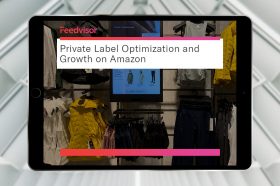Resources - Blog
How to Protect Your Amazon Business From COVID-19

Stay on top of the latest e-commerce and marketplace trends.
Amazon is cracking down on price gouging and false health claims on product listings amid consumers’ surmounting fears of the spreading coronavirus, or COVID-19. The company said it is working with state attorneys general to identify and prosecute third-party (3P) sellers who are capitalizing on consumers’ health concerns by engaging in price-gouging on the marketplace, according to Reuters. Furthermore, enforced shut downs of Chinese factories have threatened inventory supply for brands and sellers across a variety of product categories on Amazon’s marketplace. Although a portion of China’s industrial complex has begun returning to work, ongoing travel bans and border closures continue to disrupt the economy, as manufacturers are still unable to acquire materials for production and workers avoiding or recovering from illness are slow to return to work. As the virus continues to spread across the globe, and cases in the U.S. in particular continue to rise, it is likely that disruption on Amazon’s marketplace, as well as the overall retail economy, will continue for the foreseeable future. Brands and sellers operating on Amazon must have a clear understanding of the coronavirus impact, Amazon’s policies, and their supply chains to preserve their businesses.
Adhere to Amazon’s Policies to Avoid Suspension
In recent weeks, Amazon searches for health-related items like the “N95 face mask,” “hand sanitizer,” and “hazmat suits” have skyrocketed, as consumers turn to online shopping channels to avoid crowds at physical retail locations. Capitalizing on the surge in demand, Amazon merchants have been found tripling or even quadrupling their prices of these sought-after items. For example, CNBC reported that, before Amazon ran out of stock, N95 face masks were priced at $13.28, but later found examples of face masks being sold for as much as $195. Amazon thus far has removed more than 530,000 products from its platform over price-gouging concerns and has reportedly taken down “millions” of products that make unsupported claims about their ability to protect and fight against the coronavirus. In addition, the company has suspended more than 2,500 seller accounts violating its policies in the U.S. marketplace alone. Amazon recently issued the following statement to sellers:
“As you are aware, we are experiencing a global health crisis due to the COVID-19 Coronavirus. With increasing customer demand for critical safety products, we have seen examples of egregious pricing from third party sellers in our store. Price gouging is a clear violation of our policies, unethical, and in some cases, illegal. As a result, we are suspending selling accounts and removing all listings for sellers who engage in price gouging in violation of the Amazon Marketplace Fair Pricing Policy. We encourage you to audit your prices to avoid this problem.”
To detect price gouging, Amazon says it uses a combination of machine-learning technology and human monitoring to continuously compare prices submitted by sellers with current and historic prices both on and off Amazon. In addition, Amazon is now deploying a dedicated team that is working 24/7 to detect price gouging on items like protective masks and hand sanitizers and prevent sellers from evading its automated systems, as price gouging on the marketplace spreads. If Amazon deems the price of your product to be egregiously high, you are at risk of not only having your listing removed but also of having your seller account suspended. To avoid these instances, be prepared with documentation of your product’s pricing history and ensure your current prices are aligned with those historical prices. Re-familiarize yourself with Amazon’s Fair Pricing Policy, which forbids price increases that “harm customer trust” and says prices should not be “significantly higher than recent prices offered on or off Amazon.” Amazon will also remove product listings that make unsupported claims about their ability to prevent, mitigate, treat, or cure diseases in humans, such as the flu or coronavirus. Be sure to review Amazon’s Prohibited Product Claims policy and make sure the details on your product page are compliant to avoid listing removal or account suspension.
Protect Your Inventory Supply
With the slowdown of factory production in China, inventory shortages are rampant across Amazon’s marketplace. Nearly half (49%) of Amazon sellers are based in China, according to Marketplace Pulse, and — even of those who are based outside of China — many brands and sellers source their inventory from Chinese manufacturers. Stock outs not only stifle sales velocity and revenue but can also demote your products in search, as Amazon’s A9 ranking algorithm heavily considers each of these factors in determining your product’s search position. While raising prices is strongly discouraged, some sellers are using this strategy to slow their sales velocity in order to conserve their remaining inventory, given the uncertainty around their future supply and production capabilities. However, with higher prices, your sales volume and conversion rate will decrease, which can, in turn, damage your ranking position. Additionally, you can only increase your prices for so long until either the product completely goes out of stock or sales come to a complete halt. Once the product is back in stock, your keyword rankings need to build themselves back up to where they were before the price increases and stockout. Products can regain their previous rankings after they are restocked, as long as sales can be generated in a timely manner. To preserve their stock, many sellers are also pulling their digital advertising campaigns or approaching their competitors or wholesalers to purchase their excess inventory. If you have a diversified supply chain, with manufacturers in a number locations, see if you can ramp up production in factories that are not impacted by the coronavirus. Amazon has offered sellers several recommendations to take precautions and preserve their account health. The company sent a notice to sellers outlining these precautions, which include canceling previously placed orders that you are no longer able to fulfill, placing your account in vacation status to protect their listing from being demoted in search, or taking additional steps to manage your inventory. The company has also reportedly been placing larger-than-normal orders from some brands and manufacturers to prevent a bigger slowdown in China’s manufacturing sector. Brands and sellers on Amazon facing coronavirus-related supply chain issues may want to rethink any new product launches that were planned for 2020, as inventory levels are crucial to the success of new product launch strategies as well as market share and high search rank placement in the long term.
Final Thoughts
The coronavirus has killed over 3,500 people and infected over 100,000 more worldwide. As the number of infections in the U.S. increases, consumer fears will only continue to grow, and businesses will be feeling the impact on the retail industry for months to come. Trade shows are also experiencing the disruption of travel bans and government health warnings. Shoptalk, Natural Products Expo West, and Prosper Show have all postponed their 2020 events to thwart further spread of the coronavirus and avoid putting attendees at risk, and the Canton Fair, China’s oldest trade show and popular event among Amazon sellers, has been cancelled. Even for industry events that have not been cancelled or postponed, you might want to reconsider your travel plans to avoid the business expense, as turn out at crowded events will likely be quite low. To protect your business from further impact by the coronavirus, re-examine your 2020 business plan to determine areas you can cut costs that will likely not produce a high return on your spend in the current climate, such as online promotions or travel plans. Be sure to check Amazon for updates on a daily basis as well as ensure your product prices are fair and your listings do not make unsubstantiated health claims related to coronavirus in order to avoid account suspension or listing removal.
Learn what Feedvisor can do for your business.
When you partner with Feedvisor, you automatically receive access to our true, AI-driven technology and hands-on team of e-commerce experts. Contact one of our team members today to learn more about our end-to-end solution for brands and large sellers on Amazon, Walmart, and e-marketplaces.

![Amazon PPC and SEO Strategies to Optimize Paid and Organic Search Rank [Webinar Recap]](https://feedvisor.com/wp-content/uploads/2020/02/ppc-vs-seo-on-amazon-why-you-need-both-280x186.jpg)


